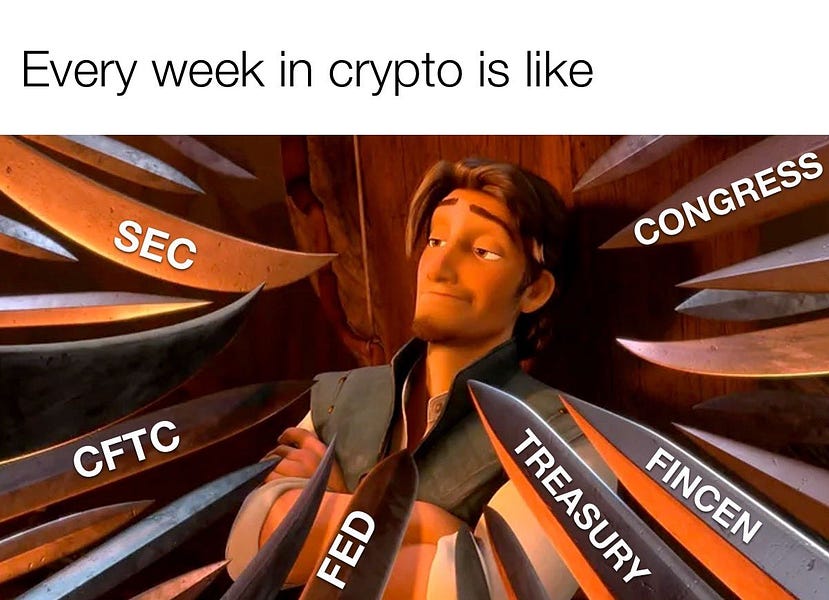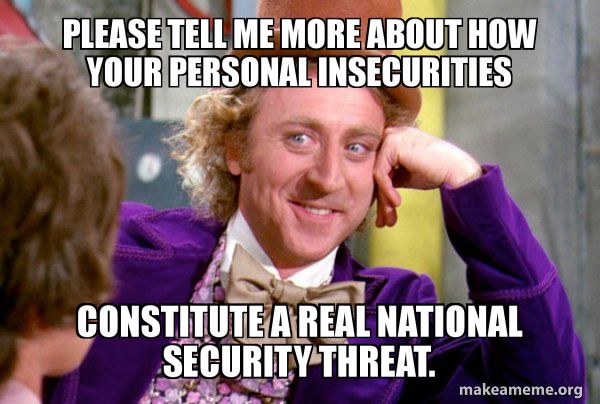Why they hate crypto

Dear Bankless Nation,
The white house said crypto is a MATTER OF NATIONAL SECURITY this week.
Here we go again.

If you’re anything like me, you don’t spend all your waking hours trying to figure out how the U.S. government is trying to kill crypto next.
You care deeply.
You want a sensible crypto policy.
You want to defend crypto against incumbents who want to strangle this freedom-giving technology and cage us all in their tilted, broken, systems.
Three things that happened just this week…
- White House Says It Wants Crypto Rules as a Matter of National Security so they’re releasing a memo in the next couple of weeks. When they use the term NATIONAL SECURITY you know it’s not good.
- Language was introduced in the COMPETES Act that would give Treasury a blank check to ban crypto at exchanges. That sounds bad and some crypto advocates are imploring us to call our representatives to get this removed.
- The SEC is sneak attacking DeFi. They're trying to expand the definition of “securities exchange” to include AMMs & DeFi protocols, maybe wallets & block explorers too while giving only 30 days to comment so they can slip it through.
It’s exhausting to keep up with.
What do I think about these issues?
On the white house’s crypto rules, we’ll see.
On the COMPLETES act, I’m with Jake Chervinsky “don’t lose any sleep”.
On the SEC sneak attack, it’s hard to know intent. We do know Gary Gensler wants power over crypto and his actions tell us he’s more excited to protect incumbents than retail. In her dissent, Heister Peirce says it’s an “irresponsible abdication” to only give the public 30 days to comment. Yep—she nailed it. 30 days is a joke—I guess we hurry up and comment then wait for the next attack? Gaslight much?
Feels like we’re battling a hydra with infinite heads bent on the destruction of Web3 in America. Why do they hate crypto so much?
Why don’t get out of crypto’s way as they did with the early internet?
I used to ask these questions more but now…
I think we should expect this
This has all happened before—many times in fact.
It turns out crypto isn’t special.
The conflict between incumbents who marshall nation-state powers in an effort to squelch the disruptive new information networks isn’t an exception, it’s the rule.
I’m reading a book called The Master Switch recommended to me by Brian Armstrong. The book chronicles the rise and fall of the phone, radio, tv, and cable information networks.
Each of these fit a similar pattern—the centralized network tried to delay the new decentralized technology through laws, regulators, presidents, congress, and corporate raiding. In some cases they were able to delay the advance of the new technology by years—FM radio for example was squelched for decades by Radio Corporation of America with major assistance from the FCC.

But in all cases, disruptive technology eventually wins.
The pendulum swings from centralization to decentralization and then back again…over and over, back and forth.
Crypto is the next turning
The next turn of the wheel is crypto.
Centralized banking networks have had their day, it’s time for capital to be free again. Centralized tech companies have had their moment, it’s time for creators to own their contribution again.
They can delay this. They can defer it. But they can’t stop it.
And any attempts to do so only harm their citizens and delay the inevitable.
Missing crypto means missing an economic opportunity, the best jobs, the export of the U.S. dollar through stablecoins, and national leadership in capital markets. These are the foundations of national security.
I guess they were right about one thing.
Crypto is a matter of national security.
And by failing to support it, they make their nation less secure.
Here’s what’s lined up for next week:
- We sit down with Haseeb Qureshi to talk about crypto projects across the world
- How to take governance bribes (listen to our episode on Curve wars as a primer!)
- Layer 2 tokens 🔥
Have a 🤖 weekend.
- RSA